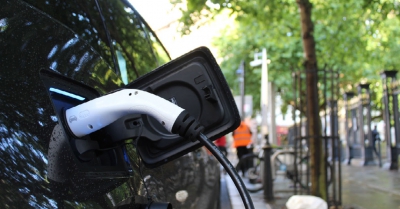
Transport
Apr 25 2024
Birmingham Airport (BHX) has achieved Level 3 (optimisation) of the Airport Carbon Accreditation (ACA) scheme for a second year.
Read more
New analysis by Midlands Connect suggests that urgent action is needed to speed up the installation of electric vehicle charging points (EVCPs) across the Midlands.
‘Supercharging the Midlands’, a report authored by the sub-national transport body, suggests that EV use will increase by over 3,000% by the end of the decade, and that installation of public EV charging points must be six times as fast to support growing demand.
At present, 93% of EV owners have access to off-street parking and can install an at-home EV charger, however, a third of Midlands households do not have off-street parking, and so would need to rely solely on public chargers to power their EV.
Research with over 3,500 people across the Midlands reveals that a lack of public charging points is a concern for 55% of motorists and is a factor that puts them off switching to an EV.
Anxiety about battery range was also an issue for half of respondents. Despite these concerns, 77% of those questioned (with access to a petrol/diesel vehicle) would consider buying an EV next.
Estimates suggest that by 2030, the Midlands could be home to over 1.7million EVs, with over 1 in 4 vehicles being electric.
At the moment less than one in every one hundred vehicles is an EV. To support this growing number of EVs, 39,410 new public EV charging points must be installed across the Midlands by the end of the decade.
This means installing eleven new EVCPs every day, 76 per week, and 3,491 per year until the end of 2030.
The speed of installations needed to meet these targets is over six times the current rate.
Although private investment in public EVCPs is available, many local authorities struggle to secure financial backing for sites that are less-commercially viable, particularly those in rural or residential locations, while limited capacity at National Grid sub-stations also presents operational challenges.
Transport bosses are concerned that a failure to increase public charger installations could slow down the take up of EVs and have negative environmental consequences.
While carbon emissions in the energy industry have fallen by 63% between 1990 and 2019, the transport sector has seen a fall in emissions of just 5% in the same period.
The UK’s carbon emissions must fall by 100% (based on 1990 levels) by 2050 to meet climate targets.
Maria Machancoses, Chief Executive of Midlands Connect, said:
We’re in the grip of a climate emergency, and when it comes to installing EV charging points, the Midlands cannot fall behind.
By working together to create a region-wide EV strategy and overcome the challenges of installing the infrastructure we need, we can move one step closer to decarbonising our transport network.
Local Authorities across the Midlands are doing a great job to roll out charging points, but they cannot do this alone. Government, the automotive industry and private suppliers must all play a part in speeding up the roll out and ensuring councils have the support they need.

Transport
Apr 25 2024
Birmingham Airport (BHX) has achieved Level 3 (optimisation) of the Airport Carbon Accreditation (ACA) scheme for a second year.
Read more
Global
Apr 24 2024
World-leading materials science and technology consultancy Lucideon is targeting international growth with expansion in the Japanese market.
Read more
Global
Apr 18 2024
The Midlands Engine Partnership will host a Pavilion for the very first time at this year’s UK Real Estate Infrastructure Investment Forum [21-23 May], providing regional partners with a platform to showcase their investment propositions, worth in excess of £42bn, to a global audience.
Read more